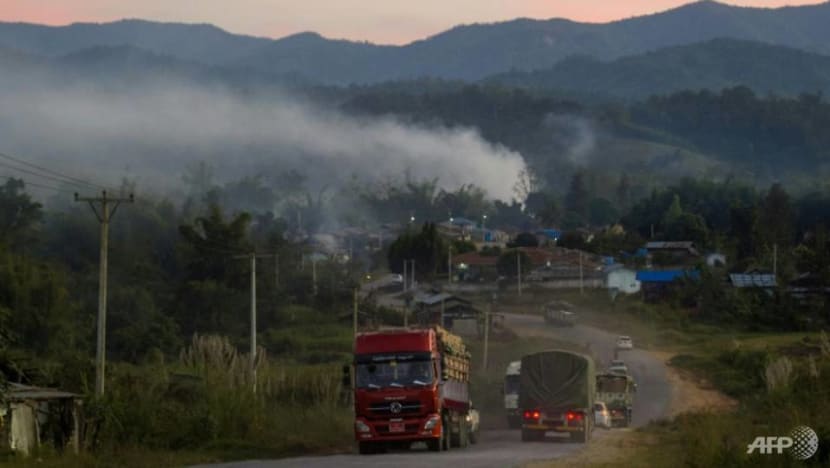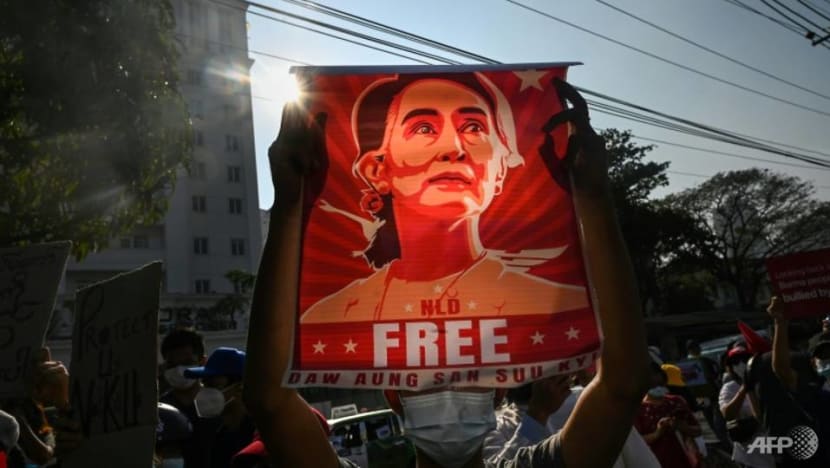Commentary: Why are Chinese troops assembling on the Myanmar border?
With no signs of a resolution to the Myanmar crisis, China is uneasy about its interests in the country and making contingency plans to protect those interests, says an observer.

Muse, on the border between China and Myanmar, is an important gateway for trade. (File photo: AFP/Ye Aung THU)
BANGKOK: China’s interests in Myanmar has gradually increased in recent years.
This has materialised through three different but related means — individuals privately investing mostly in Mandalay and northern Myanmar, corporations investing in industrial estates and farming land, and state-level investment in long-term developmental projects such as oil and gas pipelines from Kyaukpyu to Kunming.
But for these investments to succeed, peace and order in Myanmar is necessary.
Chinese institutions and individuals know all too well that when there is internal disorder, ethnic Chinese families and businesses can very quickly be victimised. And such disorder is widespread in Myanmar — especially in the northern border regions — due to armed uprisings against the state and against rival factions.
READ: Chinese city on Myanmar border locked down again over COVID-19 fears
READ: China 'very concerned' for safety of citizens in Myanmar
Cash-based trade in narcotics and precious stones pose another threat to law and order.
When China closed its border with Myanmar in September 2020 due to the spread of COVID-19 and a Myanmar government seemingly overwhelmed by the problem, the impact was immediately apparent.
Border trade between the two countries at the Muse crossing alone was worth more than US$3.4 million per day and traders and farmers cannot afford the loss of such revenue.
The border closure damages Chinese investors who have established banana plantations and are now threatened with the loss of their principal market. Banana plantation investment is a contentious issue in Kachin State, where portions of the estimated 40,000 acres of land concerned was expropriated from internally displaced persons or otherwise designated as vacant.
IMPACT OF THE COUP
Myanmar’s military coup in February 2021 resulted in widespread protests across the country, some of which have involved attacks on Chinese-held factories in Yangon and elsewhere.

Many people in Myanmar blame the Chinese government for its supposed role in supporting the coup for political or arms sales reasons.
The situation is particularly tense in Kachin State as the demonstrations are contributing to renewed fighting between Myanmar’s military (the Tatmadaw) and the Kachin Independence Army (KIA). The new military regime says that Chinese-invested factories will be protected, but their reach does not cover the entire country.
Given the difficulties involved in knowing exactly what is happening in the country now that internet connectivity is compromised, some details remain vague. But it appears that some longstanding grievances are being exercised under the pretext of the conflict.
READ: Commentary: Solution to Myanmar's political crisis lies beyond Aung San Suu Kyi or the military
For example, the Tatmadaw raided some Kachin churches apparently searching for certain individuals and even going through dustbins to find evidence.
Elements of the KIA also staged an arson attack on a plant of Yuzana Co., perhaps because of the company’s links with previous instances of land confiscation in the Hukawng Valley.
These skirmishes escalated into large-scale fighting with numerous dead and wounded on both sides. Tatmadaw forces now deploy aerial and artillery strikes against ethnic minority communities in addition to the outrages perpetrated by the boots on the ground.
READ: Commentary: Myanmar learnt the wrong lessons from Indonesia’s political transition
ASSEMBLING OF TROOPS
There is now potential for international escalation as Chinese troops are reported to be assembling in Jiegao, an important border town, which is not unexpected during periods of elevated tension.
The troops are said to have rapid response capabilities if it is deemed necessary to guard the Kyaukpyu pipelines. The pipelines are a significant part of China’s Belt and Road Initiative in Myanmar, along with the Muse–Mandalay highway, the Myitkyina Industrial Zone and the Yangon Redevelopment plans.
These projects could bind the two countries together at a functional level even when the governments scarcely speak to each other.
READ: Commentary: Did the world just get a second Belt and Road Initiative?
It was always difficult to believe that there were no Chinese boots on the ground ready for just such an occurrence, although rumours were difficult to substantiate. Plans have certainly been drawn up should the worst eventuate and pose a serious threat to the wellbeing of prominent Chinese interests in Myanmar.
The likelihood of ASEAN–Chinese joint action to stabilise the country seems unlikely, given ASEAN’s institutional weakness. Perhaps there is an opportunity for the Biden administration to engage China in talks over maintaining order, which could act as a confidence-building measure more generally.
If not, then China might see an opportunity to take its cross-border influence to a new level by partnering openly with one or more of the parties involved in fighting.
China would be likely to receive support from both Laos and Cambodia in this respect, given the level of investment already targeted there. The generals who run Thailand have been reluctant to criticise China and complied with the request to return Uyghur refugees some years before.
As Thai dissidents are being silenced in the region, now is unlikely to be the time that Bangkok changes its tune. Indeed, the Thai navy has just taken delivery of three Chinese amphibious tanks.
John Walsh is the Director of English Language Programmes at International College, Krirk University, Thailand. This commentary first appeared on the East Asia Forum.










